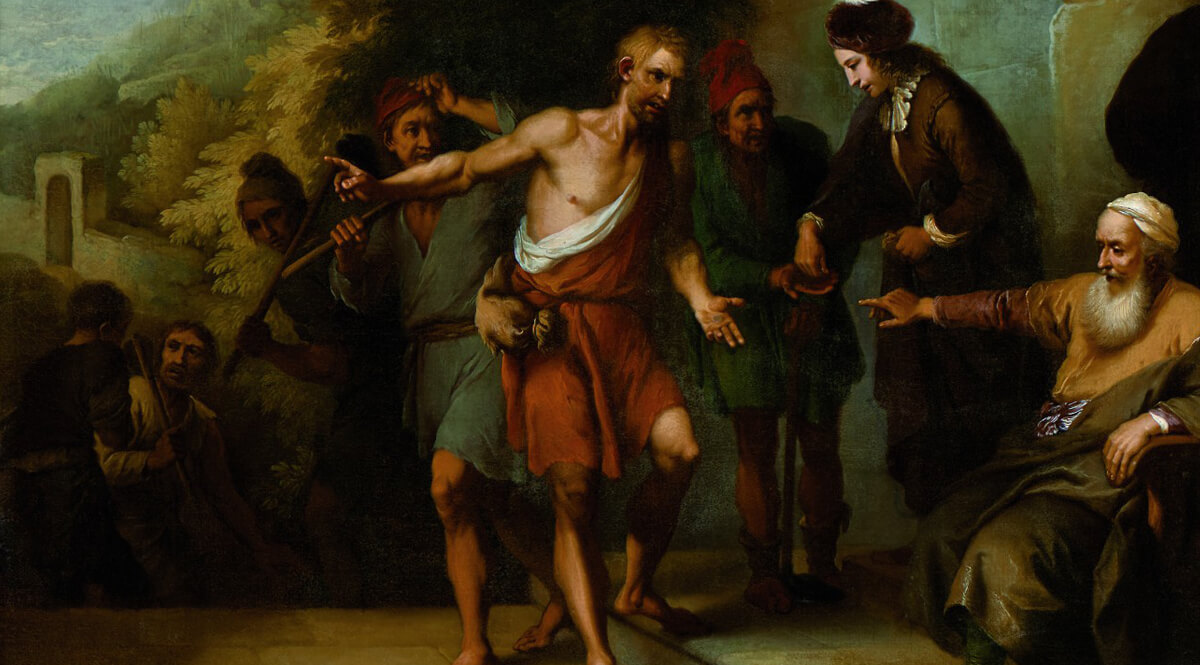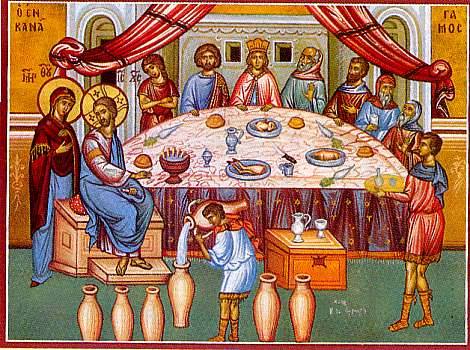January 28, 2018
The laborers agreed with the master for a denarius a day. Yet, at the end of the day, the laborers grumbled against the master for only paying them a denarius. They were upset, because the master paid even those who only worked the last hour the same as them, who labored all day in the scorching heat. They thought that because they worked more, they should get paid more. They deserved more than those who hardly got their hands dirty. They thought this way, because they were striving after a perishable wreath.
These laborers wanted the master to judge them according to the law. According to the law they should get paid more, because they worked more. But if you want to be judged according to the law, that is, according to your own works, then you better be prepared to be judged to the full extent of the law. Galatians 3 states, "For all who rely on works of the law are under a curse: for it is written, 'Cursed be everyone who does not abide by all things written in the Book of the Law, and do them.'" (vs. 10) And so theses laborers were told to take their wages and go. And so, it will be for everyone, who wants to be paid according to their own works and not by God's grace. And Scripture is clear what their wages will be, "The wages of sin is death, but the free gift of God is eternal life in Christ Jesus our Lord." (Romans 6:23)
The Johnny-come-lately laborers, on the other hand, didn't agree on a set price with the master. Rather the master said to them, "Whatever is right I will give you." Well, what is right? Does right mean fair, as most would expect? Does the master promise to pay them a fair wage, that is, a wage equal to the amount of work they put in? Evidently not, as we see they get paid more than a fair wage! So, what does the master mean by, "Whatever is right"?
To learn the meaning of a word it can be helpful to follow the etymology of the word. The noun righteousness is related to the adjective right. Right usually means lawful or just. But a more helpful way of understanding the meaning of a word is to look at how the word is used. In Scripture God will often tell us what a word means by paralleling it with another word. For example, Psalm 89:14 states, "Righteousness and justice are the foundation of your throne; steadfast love and faithfulness go before you." And again Psalm 103:17 states, "But the steadfast love of the LORD is from everlasting to everlasting on those who fear him, and his righteousness to children's children." And God speaks to Israel in Hosea chapter 2, "I will betroth you to me forever. I will betroth you to me in righteousness and in justice, in steadfast love and in mercy." (vs. 19)
In Scripture God frequently parallels the word righteousness with steadfast love. This means that what is right according to God does not depend solely on what is fair, but rather, what is right depends on God's steadfast love. When the master told the laborers, he was going to pay them what was right, he was not saying he would pay them based on how much they worked. He was saying he would pay them based on his own steadfast love.
This is why all the laborers got paid the same. They weren't getting paid according to their work, but according to the master's generosity. And this is how it works in the kingdom of heaven. We are not rewarded by God based on how much we work, but based on God's steadfast love and mercy. In other words, God saves us by grace through faith apart from our works.
This is not the way it works in this world. An employer who pays all his employees the same no matter how much work they do or don't do will soon go out of business. This is why communism consistently fails as an economic policy. People need to be paid according to how much they work or else the work won't get done.
Likewise, not everyone can be equal. A student cannot be equal to his teacher. Otherwise the student would not submit to the teacher's instruction. An employee must do what the employer says, not the other way around. There is much talk these days about equality. But unless we are talking about equal justice under the law there can't really be complete equality. Because we're all different! Not everyone is going to have the same station in life. A father can't be a mother and a mother can't be a father. Children must submit to their parents. Not everyone can be a pastor, or a mayor, or a judge. And this is good. God has ordered the world, so that there are structures of authority and each person has his own different obligations, skills, and interests.
Yet, in Christ's kingdom there is no inequality. We all get paid the same. In the kingdom of heaven kings and paupers, students and teachers, mothers and daughters, they all are the same. Why? Because they all have the same Christ, as it is written in Ephesians chapter 4, "one Lord, one faith, one baptism." We all believe in the same Jesus. Is your Jesus better than my Jesus? What a ridiculous question! There is only one true Christian faith. This is why we confess together as a congregation the Nicene Creed and why we are all baptized into the faith of the Apostles' Creed. We confess together one unified faith. Is my faith better than your faith? How can this be, if we confess the same faith? And we should all confess the same faith, because we have the same Lord, who teaches the same thing. We should all have personal faith, that is, faith which dwells in each of our hearts, but our personal faith is no good if it is not the same common faith shared by Christ's church.
Kendall is a few years older than her sister Aria. Did Kendall get baptized better than Aria? Of course not! Or for an even more extreme example, did St. Paul receive a better Baptism than us? How could that be? There is only one Baptism into which we are all baptized. No one could have a better baptism or get baptized better than another, because Baptism is not our work, but God's, as St. Paul writes in Titus 3, "He saved us, not by works done by us in righteousness, but according to his own mercy, by the washing of regeneration and renewal of the Holy Spirit, whom he poured out on us richly through Jesus Christ our Savior."
Baptism is grace, that is, a gift. In Baptism the same God put his name on Kendall and Aria, who put his name on all of us in our Baptism. They received the same Holy Spirit. All their sins were washed away, just as ours were. They are joined to the same body of Christ as we are and they are our equals in the kingdom of heaven, as St. Paul writes again in Galatians chapter 3, "For in Christ Jesus you are all sons of God, through faith. For as many of you as were baptized into Christ have put on Christ. There is neither Jew nor Greek, there is neither slave nor free, there is no male or female, for you are all one in Christ Jesus." (vss. 26-28)
We are all equal in the kingdom of heaven, because we all receive the same Christ through faith. But what would happen if we were paid according to our work? Well, we certainly would fall short of the glory of God. Examine yourself according to the Ten Commandments. Have you loved the Lord your God with all your heart, soul, strength, and mind? Have you truly loved your neighbor as yourself, even in your thoughts, in your very heart? You know the answer. So, if we were not dealt with according to God's grace, we would not be able to live in God's kingdom.
Now, God is not unrighteous or unlawful. Our payment was earned, just not by us. Our wages were earned by Christ Jesus, who sacrificed his life, so that he could give us eternal life. When God tells us that whatever is right he will give to us, he is saying that he will give us forgiveness of our sins, because Jesus rightly took them away from us and disposed of them on the cross. So, when we want to see God's righteousness, we don't look to the Ten Commandments, which we have not kept, but we look to the cross where Christ made it right between us and God.
We do not receive the kingdom of heaven based on our works. Yet, it is still necessary for us to work. The master still sent the lazy loafers into the vineyard to work. Ephesians 2:10 states, "For we are his workmanship, created in Christ Jesus for good works, which God prepared beforehand, that we should walk in them." Before the foundation of the world God not only chose you to be saved through faith, but he also appointed good works for you to do in honor of him. These works do not save you, but God still intends for you to do them. Yet, how we do them is much different than those laborers, who sweat and bled in the hot sun for twelve hours. They labored, because they felt compelled to earn their reward. We, however, feel no coercion. Rather, we work with the freedom of knowing that God will pay us what is right based on the sacrifice of Christ on the cross.
It is as Jesus says in Matthew 11, "Come to me, all who labor and are heavy laden, and I will give you rest. Take my yoke upon you, and learn from me, for I am gentle and lowly in heart, and you will find rest for your souls. For my yoke is easy, and my burden is light." (vss. 28-30) Our burden is light, because we work as those who know our place in God's kingdom based on his promise of undeserved grace.
Whether you are a husband or wife, parent or child, CEO or hourly worker, in the kingdom of heaven through faith in Jesus Christ you are all equal. You receive the same forgiveness of sins. You are baptized into the same name. You receive the same body and blood for your forgiveness. And this should give you confidence to work in the station of life God has placed you. The mother, who nurses her baby, cleans up messes all day, and says prayers with her children at bedtime does good work in God's vineyard. The husband, who sacrifices his time and energy to feed his family and provide for them does good work. The child, who clears the table after supper and does her homework works well in God's vineyard. The student, who studies, the teacher, who teaches, the musician, who plays, and on and on, they do good work well pleasing to the generous master of the vineyard. And because they are assured of being given what is right, they do not fear that their work is not enough, because Christ's work is enough.
Whatever your station in life is, God wants you to work joyfully out of love for him and to help and serve your neighbor. Yet, your reward has already been secured by the death and resurrection of Christ Jesus. And no matter how lowly you might consider your station in life, through faith in Christ you should know that you have a royal rank in the kingdom of heaven. Amen.





 RSS Feed
RSS Feed